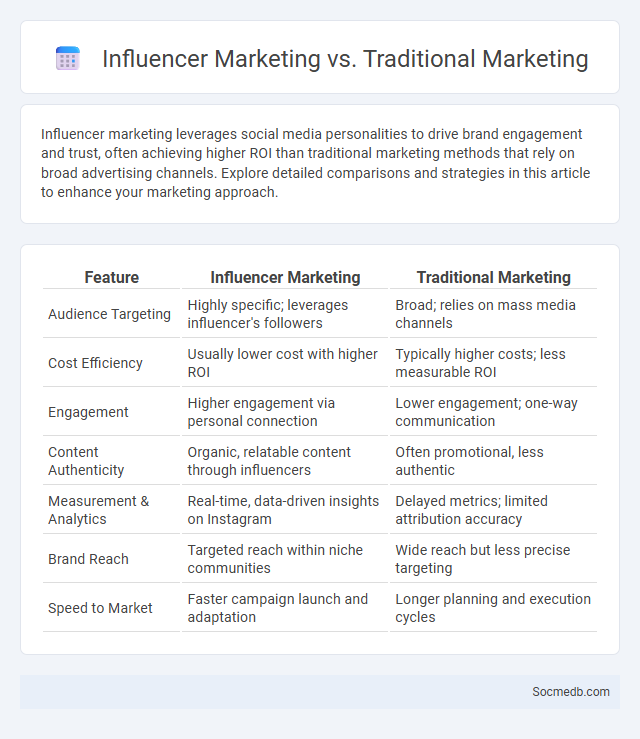
Photo illustration: Influencer Marketing vs Traditional Marketing
Influencer marketing leverages social media personalities to drive brand engagement and trust, often achieving higher ROI than traditional marketing methods that rely on broad advertising channels. Explore detailed comparisons and strategies in this article to enhance your marketing approach.
Table of Comparison
| Feature | Influencer Marketing | Traditional Marketing |
|---|---|---|
| Audience Targeting | Highly specific; leverages influencer's followers | Broad; relies on mass media channels |
| Cost Efficiency | Usually lower cost with higher ROI | Typically higher costs; less measurable ROI |
| Engagement | Higher engagement via personal connection | Lower engagement; one-way communication |
| Content Authenticity | Organic, relatable content through influencers | Often promotional, less authentic |
| Measurement & Analytics | Real-time, data-driven insights on Instagram | Delayed metrics; limited attribution accuracy |
| Brand Reach | Targeted reach within niche communities | Wide reach but less precise targeting |
| Speed to Market | Faster campaign launch and adaptation | Longer planning and execution cycles |
Understanding Influencer Marketing
Influencer marketing leverages individuals with significant online followings to promote brands authentically, increasing trust and engagement among target audiences. By collaborating with influencers whose values align with your brand, you can enhance visibility and drive conversions effectively. Understanding the metrics such as engagement rate, follower demographics, and content relevance enables you to optimize your social media strategy for better ROI.
What Is Traditional Marketing?
Traditional marketing refers to conventional advertising methods used before the rise of digital platforms, including print ads, TV commercials, radio spots, direct mail, and billboards. These strategies focus on broad audience reach through physical or broadcast media channels to build brand awareness and drive sales. Despite the growth of social media marketing, traditional marketing remains effective for local businesses and demographics less engaged with digital technologies.
Defining the Role of an Influencer
An influencer leverages social media platforms to shape audience opinions, drive engagement, and promote products or ideas through authentic content. They act as trusted intermediaries between brands and consumers, using their credibility and reach to enhance brand visibility and trust. Influencers strategically build personal brands that resonate with target demographics, maximizing impact on buying decisions and cultural trends.
Key Differences: Influencer Marketing vs Traditional Marketing
Influencer marketing leverages social media personalities with established trust and niche audiences to create authentic brand endorsements, whereas traditional marketing relies on broad media channels like TV, radio, and print for mass reach. Influencers generate higher engagement through personalized content and direct interaction, contrasting with traditional marketing's one-way, less targeted messaging. Metrics in influencer marketing emphasize likes, shares, and comments, while traditional marketing focuses on reach and frequency metrics.
Advantages of Influencer Marketing
Influencer marketing leverages trusted online personalities to enhance brand credibility and reach highly targeted audiences through authentic content. Your campaign benefits from increased engagement rates and better conversion potential compared to traditional advertising methods. Collaborations with influencers also provide measurable insights, enabling optimization of marketing strategies for higher return on investment.
Advantages of Traditional Marketing
Traditional marketing offers tangible materials such as print ads, direct mail, and billboards that create lasting physical impressions. These methods often build trust and credibility with established audiences who may be less active on social media platforms. Your brand can benefit from the broad reach and localized targeting that traditional channels provide, complementing digital strategies for a well-rounded marketing approach.
Limitations and Challenges of Each Strategy
Social media strategies face limitations such as algorithm changes that reduce organic reach, making it harder for your content to engage target audiences consistently. Paid advertising demands significant budgets and precise targeting, which can limit ROI if mismanaged or if audience data is inaccurate. Influencer partnerships pose risks related to brand alignment and authenticity, potentially weakening your messaging if not carefully vetted and maintained.
Measuring ROI: Influencer Marketing vs Traditional Marketing
Measuring ROI in influencer marketing involves tracking specific metrics such as engagement rates, click-throughs, and direct conversions tied to influencer campaigns, providing clear attribution and real-time insights. Traditional marketing ROI is often assessed through broader metrics like brand awareness, sales lift, and market surveys, which can be less precise and slower to evaluate. Influencer marketing typically offers higher engagement and better targeting efficiency, making ROI measurement more actionable compared to traditional methods.
When to Choose Influencer Marketing Over Traditional Marketing
Choose influencer marketing over traditional marketing when targeting niche audiences and seeking authentic engagement on social media platforms like Instagram, TikTok, or YouTube. Influencer campaigns deliver higher trust and conversion rates by leveraging creators' personal connections with their followers, which traditional ads often lack. Your brand benefits most when aiming for real-time interaction and personalized content that resonates deeply with specific demographics.
Future Trends: The Evolving Relationship Among Brands, Influencers, and Marketing
Future social media trends emphasize the deepening synergy between brands, influencers, and marketing strategies, driving personalized engagement and authentic content creation. Advanced AI algorithms and data analytics enable precise targeting, helping your brand connect with niche audiences effectively. Influencer marketing evolves with micro-influencers gaining prominence, fostering trust and stronger community connections that boost brand loyalty.
 socmedb.com
socmedb.com